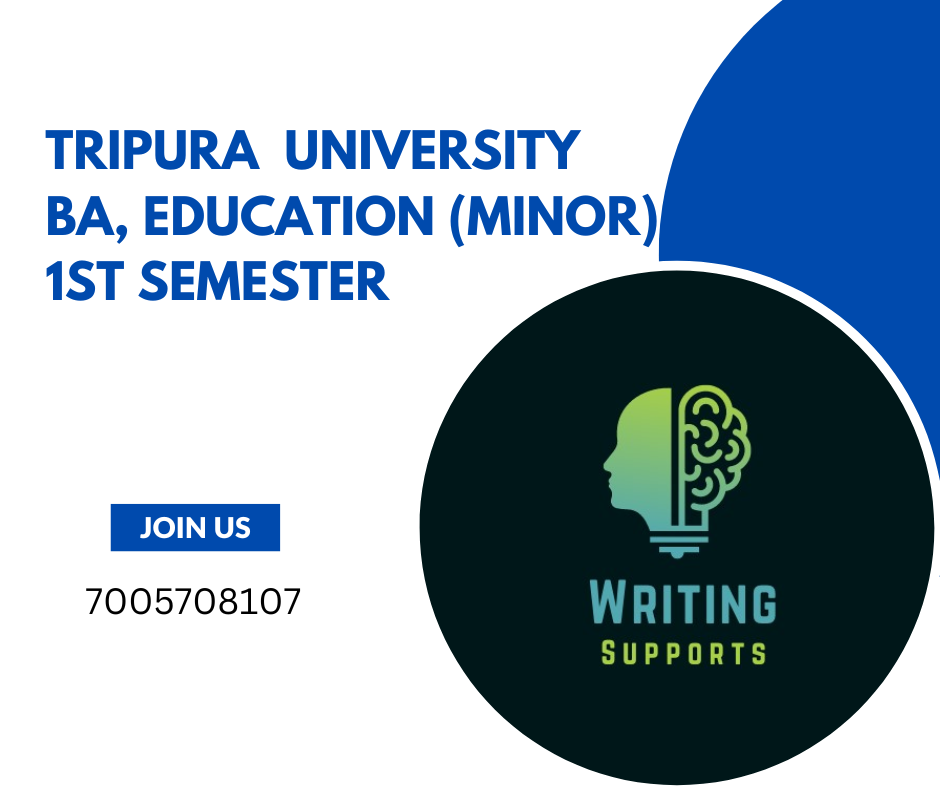BA, Education (Minor) 1st Semester Important Questions & Answers (TU)
Tripura University
BA, Education (Minor)
1st Semester
Course Contents
Unit-1: Understanding the Basic Concepts of Education
Concept of Education-Narrow and Broader Concept of Education; concept of education as a discipline
1. What is the narrow concept of education?
The narrow concept of education is limited to the formal schooling system and the acquisition of academic knowledge.
2. What are the criticisms of the narrow concept of education?
The narrow concept of education has been criticized for being too focused on rote memorization and standardized testing. It has also been criticized for neglecting other important aspects of education, such as social-emotional learning and critical thinking skills.
Broader concept of education
3. What is the broader concept of education?
The broader concept of education encompasses all of the experiences and influences that shape a person's development. It includes formal schooling, as well as informal learning experiences such as those gained through family, friends, community, and the media.
4. What are the benefits of the broader concept of education?
The broader concept of education is more holistic and inclusive. It recognizes that all aspects of a person's life can contribute to their learning and development. It also acknowledges that people learn in different ways and at different paces.
Concept of education as a discipline
5. What is the concept of education as a discipline?
The concept of education as a discipline refers to the systematic study of education. It includes the study of educational theory, research, and practice.
6. What are the benefits of studying education as a discipline?
Studying education as a discipline can help us to better understand the process of teaching and learning. It can also help us to develop more effective educational practices.
7. What are the different types of education?
There are many different types of education, including formal education, informal education, and non-formal education. Formal education takes place in schools and other educational institutions. Informal education is learning that takes place outside of formal institutions, such as through family, friends, and community. Non-formal education is organized learning that takes place outside of formal schools, such as through workshops and training programs.
8. What are the different levels of education?
The different levels of education include primary education, secondary education, and tertiary education. Primary education is the first level of compulsory education and typically lasts for six years. Secondary education is the second level of compulsory education and typically lasts for six years. Tertiary education is post-secondary education and includes universities and colleges.
9. What are the different purposes of education?
Education has many different purposes, including:
• To develop individuals' knowledge, skills, and values.
• To prepare individuals for employment and civic participation.
• To promote social and economic development.
• To preserve and transmit culture.
10. What are the different educational philosophies?
There are many different educational philosophies, including:
• Essentialism: Essentialists believe that education should focus on teaching students the essential knowledge and skills that they will need in life.
• Progressivism: Progressives believe that education should focus on developing students' critical thinking skills and their ability to learn on their own.
• Constructivism: Constructivists believe that students learn best by actively constructing their own knowledge.
• Humanism: Humanists believe that education should focus on developing the whole person, including their intellectual, emotional, and social-emotional capacities.
11. What are the different educational approaches?
There are many different educational approaches, including:
• Traditional approach: The traditional approach to education is characterized by teacher-centered instruction, lectures, and standardized testing.
• Learner-centered approach: The learner-centered approach to education focuses on the needs and interests of the students. It is characterized by active learning, collaboration, and student choice.
• Project-based learning: Project-based learning is an educational approach in which students learn by working on real-world projects.
• Blended learning: Blended learning is a combination of face-to-face and online learning.
12. What are the different educational settings?
Education can take place in a variety of settings, including schools, homes, community centers, and online.
13. What are the different roles of educators?
Educators have many different roles, including teaching, assessing, and counseling students. They also play an important role in creating a positive learning environment.
If you need full course study materials in Bengali or English medium please WhatsApp us at 7005708107
